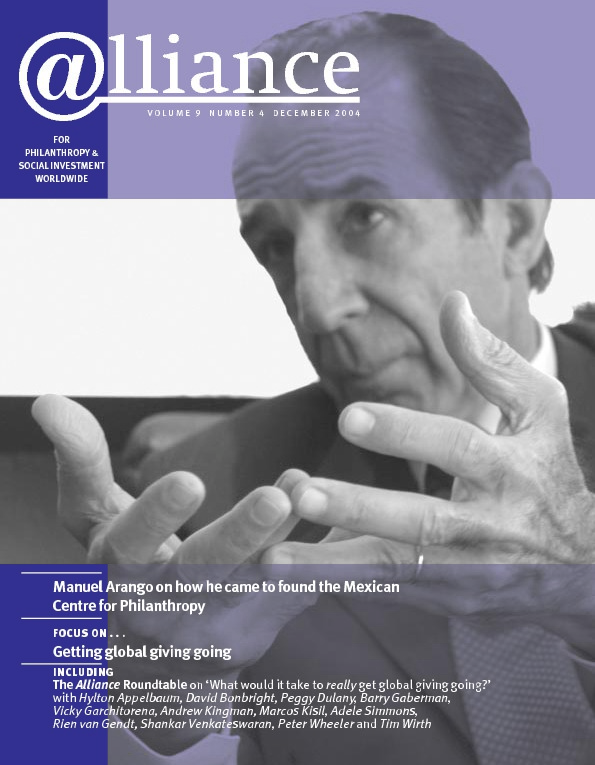In December 2003, the United Nations published a new Handbook on Nonprofit Institutions in the System of National Accounts, which for the first time calls on national statistical agencies to create special ‘satellite accounts’ documenting the scale and impact of the full range of their non-profit institutions.
Developed by the Johns Hopkins Center for Civil Society Studies in cooperation with the UN Statistics Division and statistical experts from around the world, this Handbook promises a major breakthrough in the visibility and credibility of the civil society sector, volunteering and philanthropy globally.
Now, one year later, this promise is already being fulfilled. Eleven countries have so far committed to adopting the Handbook, and half a dozen others are seriously considering it.[1] What is more, during the past several months, two of these countries – Belgium and Canada – have completed their satellite accounts and released them in published form.[2]
We thus have solid evidence that the Handbook ‘works’ and that it yields precisely the kinds of insights into the scale and operations of non-profit institutions that have long been lacking. The following are some of the significant contributions made by the Belgian and Canadian satellite account reports:
· It is clear that the non-profit sector is much larger than existing national accounts data systems have suggested. These systems bury many of the most significant non-profit institutions in the corporate or public sector, leaving only a small residue in the sector that is identified as ‘non-profit institutions serving households’ (NPISH). In the Belgian NPI satellite account, we thus learn that the full non-profit sector is over five times larger in terms of output and revenue than was formerly reported. In Canada, the satellite account reveals a non-profit sector two and a half times larger (see Table).
· The two satellite accounts confirm the findings of the Johns Hopkins Comparative Nonprofit Sector Project that the world’s non-profit sector is an enormous economic force. In Belgium, the new satellite account reports a paid non-profit labour force that is nearly 10 per cent of the country’s total, accounting for 53 per cent of the value added in health and social services and 34 per cent in community, social and personal services. With volunteers added, these totals rise by a factor of 20 per cent. In Canada, the satellite account reveals a non-profit sector that accounts for 8.6 per cent of the country’s GDP. Volunteer effort alone contributes more to Canadian GDP than does the agriculture industry.
· The Belgian and Canadian satellite accounts also provide a fuller picture of philanthropic giving than previously available by including the value of contributions of time as well as money. In Canada, for example, inclusion of the value of volunteer contributions boosts philanthropy’s share of total non-profit income from 7 per cent to 20 per cent, a threefold increase.
The adoption of the UN Handbook is thus ushering in a new era in basic statistics on the non-profit sector, philanthropy and volunteering. Policymakers, researchers and sector leaders will now have a vast store of systematic, comparative data on which to draw in designing policy, conducting research, and representing the non-profit sector to policymakers, the press and the public.
For this new era to dawn fully, however, more governments will need to be persuaded to adopt the Handbook in their statistical systems. We invite all those concerned about the future of civil society to join us in this effort. Contact us at UNHandbook@jhu.edu to learn how you can help.
1 Countries that have agreed to implement the Handbook are: Australia, Belgium, Canada, the Czech Republic, France, Israel, Italy, Kenya, New Zealand, Peru and the US. Countries actively considering adopting it include Argentina, Brazil, Japan, Mexico, Morocco, Norway, Portugal, South Africa and South Korea.
2 National Accounts Institute–National Bank of Belgium, Brussels and Centre d’economie sociale, University of Liège (2004) Satellite Account of Non-profit Institutions 2000-2001 Brussels.
Statistics Canada (September 2004) Satellite Account of Nonprofit Institutions and Volunteering: 1997-1999 Catalog no. 13-015-XIE. Ottawa.
For more information about the Handbook, email UNHandbook@jhu.edu or visit http://www.jhu.edu/ccss
Lester Salamon is Director of the Center for Civil Society Studies at the Johns Hopkins Institute for Policy Studies. He can be contacted at lsalamon@jhu.edu






Comments (0)